Planning your first trip to Athens? The historic capital of Greece beautifully blends ancient history with modern vibes. Often overlooked in favour of Greece’s stunning islands, Athens is a treasure trove of iconic landmarks, rich culture, delicious cuisine, and friendly locals. There’s so much to see and do.
Following a recent visit (after a gap of over 35 years), I have compiled this guide with my top tips to help you make the most of your visit.
- Tips for first time visitors to Athens
- 1. Plan how to get from the airport to your accommodation
- 2. Choose the right area of Athens for your stay
- 3. Plan your itinerary carefully to see the best of Athens (or take a tour)
- 4. Sample some of the amazing Greek dishes on offer!
- 5. Consider how you will get around Athens
- 6. Stay safe
- 7. Avoid the summer months (if you can)
- 8. Respect local customs
- 9. Learn some useful Greek phrases
- 10. Don't forget these!
- Conclusion
Tips for first time visitors to Athens
1. Plan how to get from the airport to your accommodation
Athens is well-connected by air, with Eleftherios Venizelos International Airport (ATH) serving as the main gateway.
The airport is approximately 20 kilometres (12 miles) from the city centre, and to get into the city, you have several options:
- Metro: Metro Line 3 (Blue Line) connects the airport to Syntagma Square in the city centre, and the journey takes around 40 minutes.
- Bus: Several express buses connect the airport to the city. The X95 express bus runs 24/7 and takes about 60 minutes to reach the city centre.
- Taxi: Taxis are readily available at the airport, with a fixed fare to the city centre.
TIP – I prebooked a transfer, which I always do when arriving at a new destination. However, the taxi was unable to navigate some of the narrow streets in Plaka, and I had to walk the final few hundred metres to the hotel. This was not an issue as I had very little luggage, but it is definitely worth considering if you are not a light packer!
2. Choose the right area of Athens for your stay
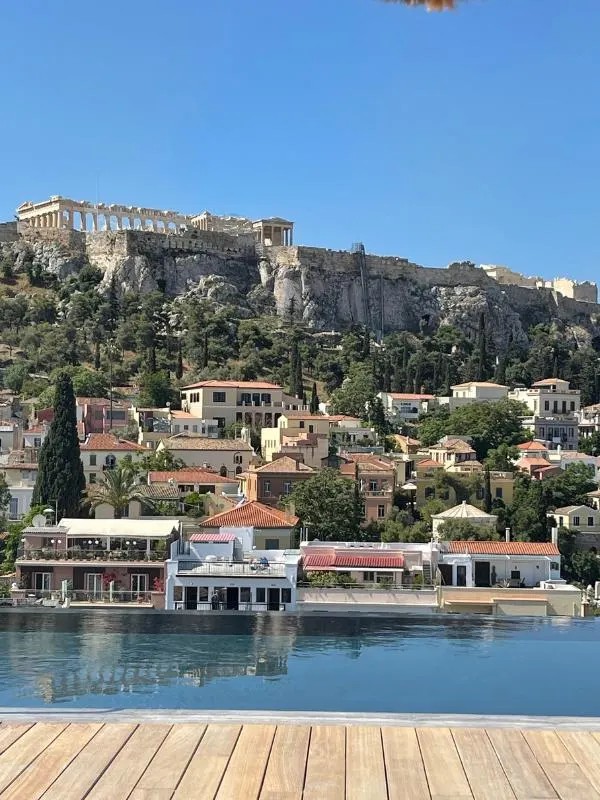
I always recommend researching the best areas to stay before booking and choosing the right one for your travel style and needs – it is so easy to make a mistake.
- Plaka: Known as the “Neighbourhood of the Gods,” Plaka is the oldest district in Athens, filled with narrow streets, neoclassical buildings, and proximity to major attractions and I loved it! So much character.
- Monastiraki: The ideal place to stay if you enjoy shopping and are looking for some nightlife.
- Kolonaki: A more upscale area with trendy boutiques, cafes, and restaurants. It offers a quieter atmosphere while still being close to the city centre.
- Syntagma: Home to the Greek Parliament and the central Syntagma Square, this area is a convenient base for exploring Athens.
3. Plan your itinerary carefully to see the best of Athens (or take a tour)
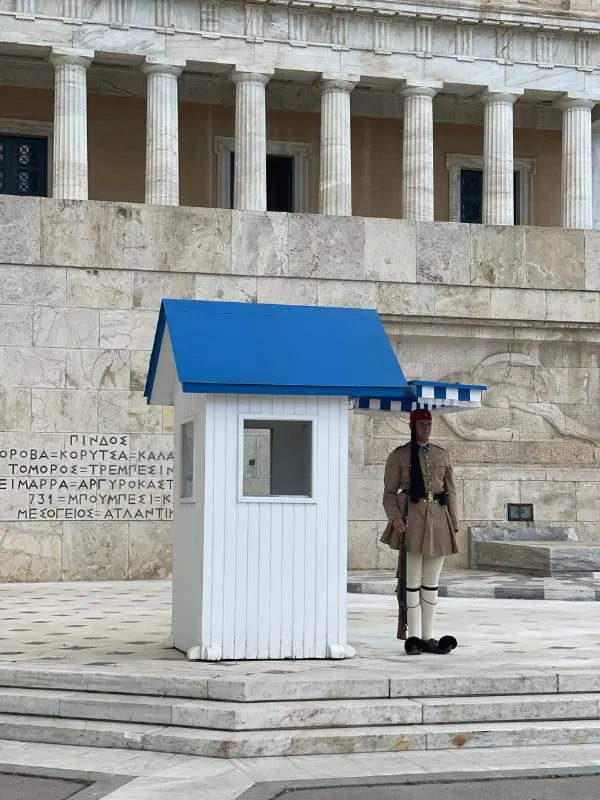
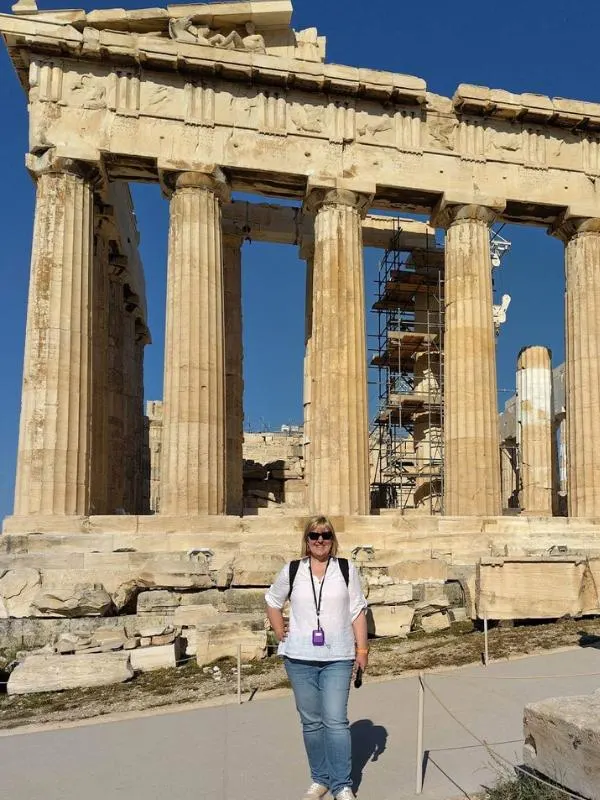
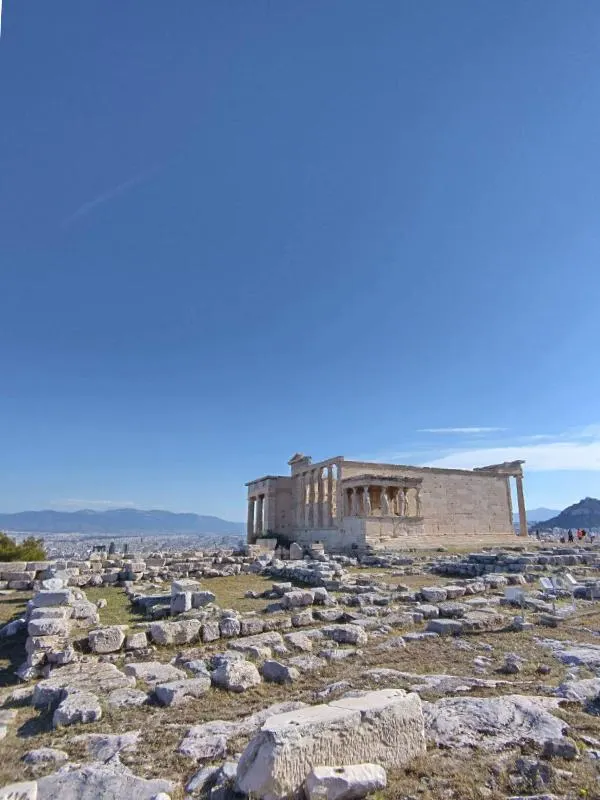
Athens is brimming with historical sites and cultural landmarks; planning your itinerary carefully to incorporate these is essential!
With limited time in Athens during my visit, I took the fantastic six-hour “One Day in Athens” walking tour with Take Walks to cram in as many city highlights as possible.
The tour covered ancient and modern attractions in a single day, including the Acropolis, Greek Agora, the Cathedral of Athens, and the Greek Parliament. It also included the changing of the Presidential Guard (impossible to watch without smiling!!!). Lunch was at a popular family-run restaurant that is popular with locals.
Walks also offer a Best of Athens city tour. This 4 hour long tour includes visits to some of Athens’s sights, including the Acropolis, Parthenon, Erechtheum, Monumental Gateway, Temple of Athena Nike, Theater of Dionysus, Theater of Herodes Atticus, Ancient Greek Agora, Temple of Hephaestus, Stoa of Attalos, Roman Agora (from the outside), Tower of the Winds (from the outside), Plaka, Tripod Street (the oldest street in the world), Arch of Hadrian, Lyssikrates Monument, and Melina Merkouri Cafe! Phew!
4. Sample some of the amazing Greek dishes on offer!

I could not get enough of the fantastic food in Athens (and it was a great precursor to the rest of the trip!) The fresh produce, particularly the olives and tomatoes, was delicious.
Some popular dishes to try include:
- Moussaka: A baked dish with layers of eggplant, minced meat, and béchamel sauce.
- Souvlaki: Skewers of grilled meat, often served with pita bread and tzatziki.
- Spanakopita: A savoury pastry filled with spinach and feta cheese.
- Baklava: A sweet pastry made of layers of filo filled with chopped nuts and honey (my favourite!)
Many tavernas are touting for business at all times of the day, and you certainly will not go hungry!
5. Consider how you will get around Athens

Athens has an efficient and modern public transport system, including the metro, buses, and trams. However, I found walking to be the best way to explore the city – especially if you are staying in an area like Plaka, where you will find many of the city’s most popular sights.
The Athens Metro is fast and reliable, with three lines connecting key areas of the city. It’s also an easy way to reach the port of Piraeus if you plan to visit the Greek islands.
Buses and trams are useful for reaching areas not covered by the metro. Tickets can be purchased at metro stations, kiosks, and at some bus stops.
6. Stay safe
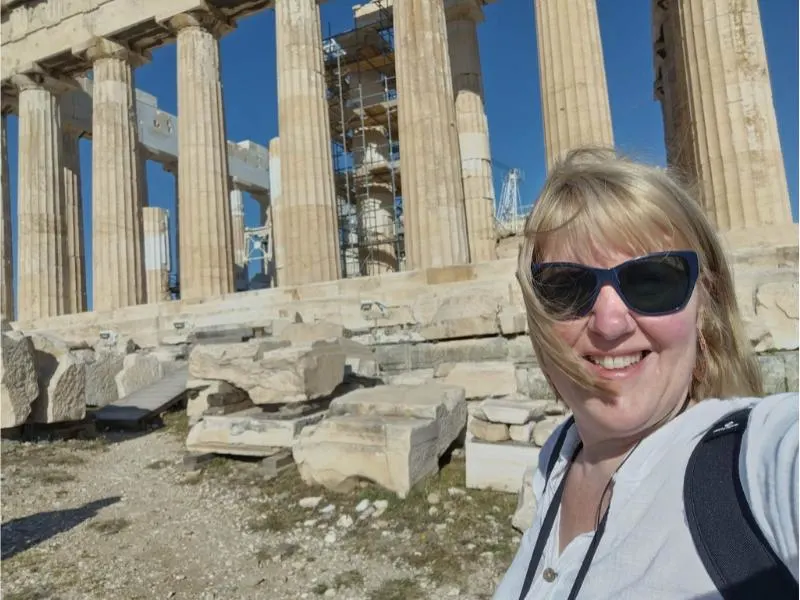
As with any large city, be careful and stay vigilant. Pickpockets are an issue, especially in crowded areas such as popular tourist sites and public transport.
I always travel with a Travelon pick-pocket proof cross-body bag or back-pack, use a lanyard for my phone, and avoid carrying valuable items when I’m out and about. This is no different whether I am in Athens, London, Paris, or New York!
It is worth noting that the emergency number in Greece is 112, and the tourist police can be contacted at 171. Hopefully, it’s not needed, but it’s useful information to keep handy.
7. Avoid the summer months (if you can)
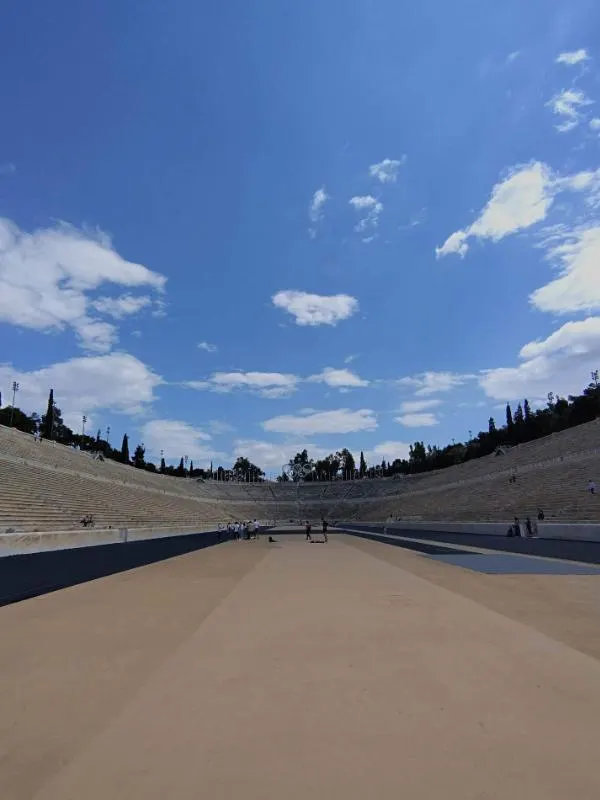
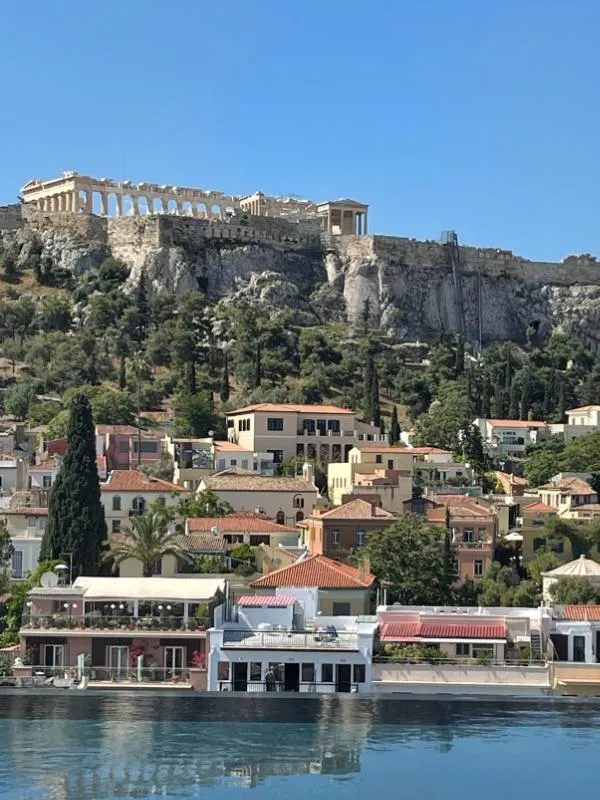
As with many destinations in southern Europe, Greece is struggling with rising temperatures during the summer months. The heat can be brutal, and visiting destinations like the Acropolis is unpleasant, if not dangerous.
The spring and autumn months (March to May and September to November) are more pleasant when the weather is mild and the crowds are smaller.
It is cooler and less crowded during the winter (December to February), but the downside is that some attractions may have shorter opening hours.
8. Respect local customs

Understanding local customs in any destination will enhance your travel experience:
- Greetings: A simple handshake is a common greeting. While Greeks are generally warm and friendly it is still polite to use formal titles when addressing someone you don’t know well.
- Dress Code: While Athens is a modern city, modesty is important when visiting churches and religious sites.
- Tipping: While tipping is not obligatory in Athens, it is always appreciated!
9. Learn some useful Greek phrases
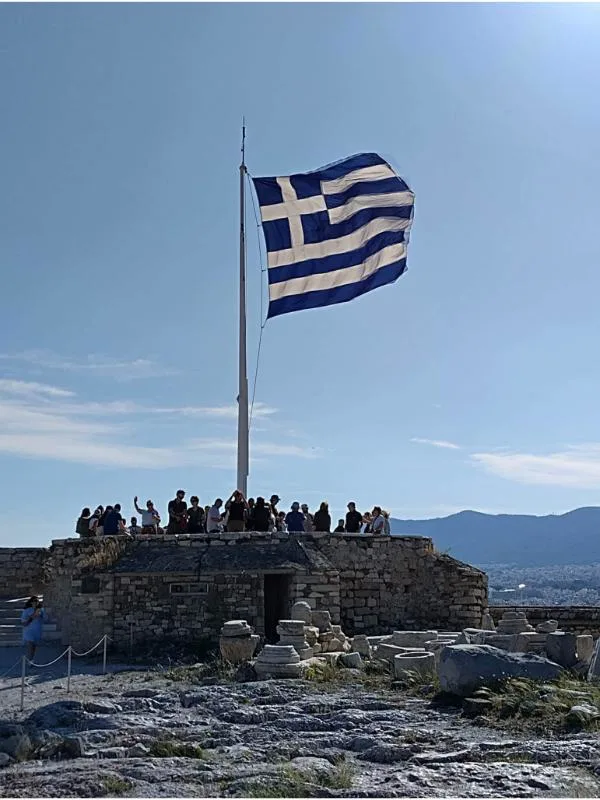
I try to ensure I learn a few basic phrases before I travel to any new destination and Greece was no exception! You will find these phrases helpful!
- Hello: Yassou
- Thank you: Efharisto
- Excuse me: Signomi
- Please/You’re welcome: Parakalo
- Good morning: Kalimera
- Good night: Kalinihta
10. Don’t forget these!
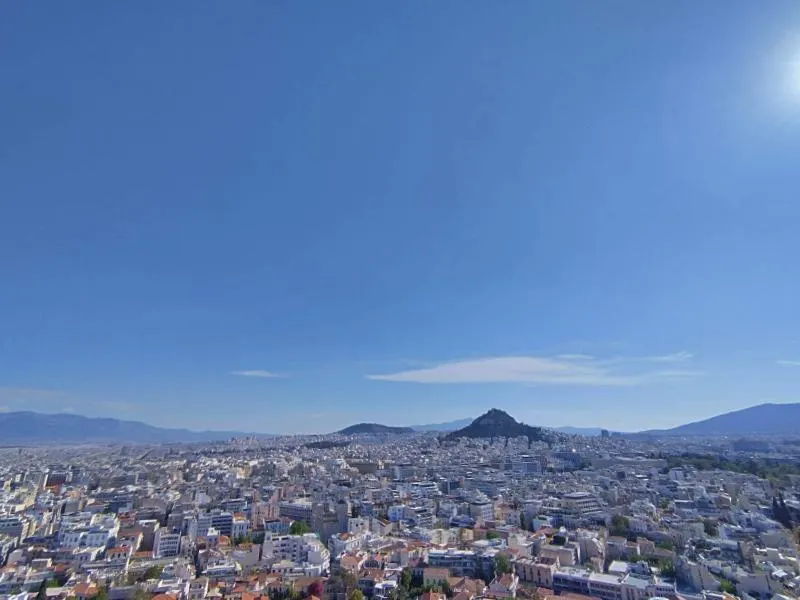
- Essential during the summer months: Bring a water bottle (this collapsible travel water bottle is ideal), sunscreen, and a hat!
- Carry some cash: While credit cards are widely accepted, it’s a good idea to carry some cash for small purchases and in case you visit places that do not accept cards. Remember that Greece uses the Euro(€), not the $!
- Stay connected: Consider adding an eSIM to your phone (check compatibility) to access maps and travel information easily.
Conclusion
Athens has a rich blend of history, culture, and modern amenities. With its ancient landmarks, vibrant neighbourhoods, and delicious cuisine, there is something for everyone.
Follow these tips to make the most of your first visit to Athens and create unforgettable memories in this timeless city! Happy Global Travel Planning!
